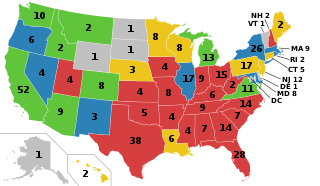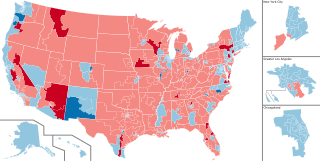Related Research Articles

In representative democracies, gerrymandering is the political manipulation of electoral district boundaries with the intent to create undue advantage for a party, group, or socioeconomic class within the constituency. The manipulation may involve "cracking" or "packing". Gerrymandering can also be used to protect incumbents. Wayne Dawkins, a professor at Morgan State University, describes it as politicians picking their voters instead of voters picking their politicians.

The Republican National Committee (RNC) is the primary committee of the Republican Party of the United States. Its members are chosen by the state delegations at the national convention every four years. It is responsible for developing and promoting the Republican brand and political platform, as well as assisting in fundraising and election strategy. It is also responsible for organizing and running the Republican National Convention. When a Republican is president, the White House controls the committee. According to Boris Heersink, "political scientists have traditionally described the parties' national committees as inconsequential but impartial service providers."
Political polarization is the divergence of political attitudes away from the center, towards ideological extremes.
Redistricting in the United States is the process of drawing electoral district boundaries. For the United States House of Representatives, and state legislatures, redistricting occurs after each decennial census.

Texas's 7th congressional district of the United States House of Representatives comprises a small area of southwestern Houston and Harris County, along with a northern portion of suburban Fort Bend County. As of the 2000 census, the 7th district comprises 651,620 people. Since 2019, it has been represented by Democrat Lizzie Fletcher.

Texas's 32nd congressional district of the United States House of Representatives serves a suburban area of northeastern Dallas County and a sliver of Collin and Denton counties. The district was created after the 2000 United States census, when Texas went from 30 seats to 32 seats. It was then modified in 2011 after the 2010 census. The current representative is Democrat Colin Allred.
Congressional districts, also known as electoral districts in other nations, are divisions of a larger administrative region that represent the population of a region in the larger congressional body. Countries with congressional districts include the United States, the Philippines, and Japan.

The politics of the Southern United States generally refers to the political landscape of the Southern United States. The institution of slavery had a profound impact on the politics of the Southern United States, causing the American Civil War and continued subjugation of African-Americans from the Reconstruction era to the Civil Rights Act of 1964. Scholars have linked slavery to contemporary political attitudes, including racial resentment. From the Reconstruction era to the Civil Rights Act of 1964, pockets of the Southern United States were characterized as being "authoritarian enclaves".

Frank Robert Mascara was an American Democratic politician from Pennsylvania who served four terms in the United States House of Representatives from 1995 to 2003.

Nebraska's 2nd congressional district is a congressional district in the U.S. state of Nebraska that encompasses the core of the Omaha–Council Bluffs metropolitan area. It includes all of Douglas County, which includes the state's largest city Omaha; it also includes Saunders County and areas of Western Sarpy County. It has been represented in the United States House of Representatives since 2017 by Don Bacon, a member of the Republican Party. It was one of 18 districts that would have voted for Joe Biden in the 2020 presidential election had they existed in their current configuration while being won or held by a Republican in 2022. With a Cook Partisan Voting Index rating of EVEN, it is the least Republican district in Nebraska, a state with an all-Republican congressional delegation.
Latino Americans have received a growing share of the national vote in the United States due to their increasing population. As of the 2020 U.S. Census, 62.1 million Latinos live in the United States, representing 18.9% of the total U.S. population. This is a 23% increase since 2010. This racial/ethnic group is the second largest after non-Hispanic whites in the U.S. In 2020, the states with the highest Hispanic or Latino populations were; Arizona, California, Florida, Illinois, Nevada, New Jersey, New Mexico, New York, and Texas. According to the Brookings Institution, Latinos will become the nations largest minority by 2045 and the deciding population in future elections. With the help of laws and court case wins, Latinos have been able to receive the help needed to participate in American Politics. According to data provided by The Collaborative Multiracial Post-Election Survey (CMPS), 72% of Latinos believe that it is very/somewhat important to get their voice heard by voting. They have traditionally been a key Democratic Party constituency, but more recently have begun to split between the Democratic and Republican Party. Since the Latino population is large and diverse, a lot of political differences exist between gender, national origin, and generational groups.

Virginia is currently divided into 11 congressional districts, each represented by a member of the United States House of Representatives. The death of Rep. Donald McEachin on November 28, 2022, left the 4th congressional district seat empty. Following the results of a special election to fill his seat on February 21, 2023, Jennifer McClellan made history by becoming Virginia's first black congresswoman.

Proposition 11 of 2008 was a law enacted by California voters that placed the power to draw electoral boundaries for State Assembly and State Senate districts in a Citizens Redistricting Commission, as opposed to the State Legislature. To do this the Act amended both the Constitution of California and the Government Code. The law was proposed by means of the initiative process and was put to voters as part of the November 4, 2008 state elections. In 2010, voters passed Proposition 20 which extended the Citizen Redistricting Commission's power to draw electoral boundaries to include U.S. House seats as well.
Authoritarianism is a political system characterized by the rejection of democracy and political plurality. It involves the use of strong central power to preserve the political status quo, and reductions in the rule of law, separation of powers, and democratic voting. Political scientists have created many typologies describing variations of authoritarian forms of government. Authoritarian regimes may be either autocratic or oligarchic and may be based upon the rule of a party or the military. States that have a blurred boundary between democracy and authoritarianism have some times been characterized as "hybrid democracies", "hybrid regimes" or "competitive authoritarian" states.
The politics of Michigan, a competitive state that leans Democratic in presidential elections, are divided. Michigan is considered part of the Democrats' "Blue Wall." Governors since the 1970s have alternated between the two parties, and statewide offices including attorney general, secretary of state, and senator have been held by members of both parties in varying proportions, though the state currently is represented by two Democratic U.S. Senators and Democrats hold every statewide office. The Democratic Party has a slim majority of two seats in the Senate of the Michigan Legislature, and the House is currently deadlocked at 54 seats for each party. The state's congressional delegation is commonly split, with one party or the other typically holding a narrow majority, and Democrats currently have a 7-6 majority.

The 2012 Project is a nonpartisan national campaign of the Center for American Women and Politics (CAWP) at Rutgers University. The project's goal is to identify and engage accomplished women to run for the United States Congress and state legislatures following reapportionment and redistricting within each state. U.S. Census data collected every 10 years include information on population shifts across the nation and are used to redraw congressional and state legislative districts resulting in new and open legislative seats. This work is done in order to comply with the 1965 Voting Rights Act and the "one person, one vote" principle. As of the 2010 Census, women made up 50.8% of the population. In terms of congressional and legislative seats, women currently make up 17% of the U.S. Senate and 16.8% of the U.S. House of Representatives. They make up a slightly larger percentage of the state legislatures at 23.6%. The aim of The 2012 Project is to increase the number of women running for state legislative and congressional office in 2012.

Gerrymandering is the practice of setting boundaries of electoral districts to favor specific political interests within legislative bodies, often resulting in districts with convoluted, winding boundaries rather than compact areas. The term "gerrymandering" was coined after a review of Massachusetts's redistricting maps of 1812 set by Governor Elbridge Gerry noted that one of the districts looked like a mythical salamander.

The 2022 United States House of Representatives elections were held on November 8, 2022, as part of the 2022 United States elections during incumbent president Joe Biden's term. Representatives were elected from all 435 U.S. congressional districts across each of the 50 states to serve in the 118th United States Congress, as well as 5 non-voting members of the U.S. House of Representatives from the District of Columbia and four of the five inhabited insular areas. Numerous other federal, state, and local elections, including the 2022 U.S. Senate elections and the 2022 U.S. gubernatorial elections, were also held simultaneously. This was the first election after the 2020 redistricting cycle.

Political polarization is a prominent component of politics in the United States. Scholars distinguish between ideological polarization and affective polarization, both of which are apparent in the United States. In the last few decades, the U.S. has experienced a greater surge in ideological polarization and affective polarization than comparable democracies.

The 2022 United States House of Representatives elections in New Mexico were held on November 8, 2022, to elect the three U.S. representatives from the state of New Mexico, one from each of the state's three congressional districts. The elections coincided with the New Mexico gubernatorial election and various state and local elections. The Democratic party gained the 2nd Congressional seat, gaining unitary control of New Mexico's Congressional delegation for the first time since 2018 and improving the advantage in the House delegation for New Mexico from 2–1 in favor of Democrats to 3–0.
References
- ↑ "Census Bureau". The Census Project. 29 November 2017. Archived from the original on 2020-11-26. Retrieved 2021-02-28.
- ↑ "Thomas Brunell". profiles.utdallas.edu. Archived from the original on 2021-01-08. Retrieved 2021-01-06.
- ↑ "Brunell CV" (PDF). UT Dallas. Archived (PDF) from the original on February 25, 2021. Retrieved January 6, 2021.
- ↑ Brunell, Thomas Lloyd (2008). Redistricting and Representation: Why Competitive Elections are Bad for America. Routledge. ISBN 978-0415964531.
- ↑ Mervis, Jeffrey (2018-05-16). "Exclusive: The would-be U.S. census director assails critics of citizenship question". Science | AAAS. Archived from the original on 2021-01-13. Retrieved 2021-02-28.
- ↑ Tracy, Abigail. "How Trump's New Census Nominee Could Rig Future Elections". Vanity Fair. Archived from the original on 2021-03-03. Retrieved 2021-02-28.
- ↑ "A Political-Science View of Trump's Reported Census Pick". www.chronicle.com. 30 November 2017. Archived from the original on 2021-01-07. Retrieved 2021-01-04.
- ↑ Berman, Ari. "Donald Trump's controversial pick to run the 2020 census just withdrew". Mother Jones. Archived from the original on 2021-02-25. Retrieved 2021-02-28.
- ↑ Gaddie, Keith (2018-01-05). "Statement from Academic Colleagues Regarding Professor Thomas L. Brunell". HuffPost. Archived from the original on 2019-04-29. Retrieved 2021-02-28.
- ↑ Crespin, Michael H. (March 2009). "Redistricting and Representation: Why Competitive Elections Are Bad for America. By Thomas L. Brunell. New York: Routledge, 2008. 160p. $130.00 cloth, $29.95 paper". Perspectives on Politics. 7 (1): 187–188. doi:10.1017/S1537592709090422. S2CID 145689981.
- ↑ McKee, Seth C. (April 2009). "Redistricting and Representation: Why Competitive Elections are Bad for America. By Thomas L. Brunell. (Routledge, 2008.)". The Journal of Politics. 71 (2): 782–763. doi:10.1017/S0022381609090665.